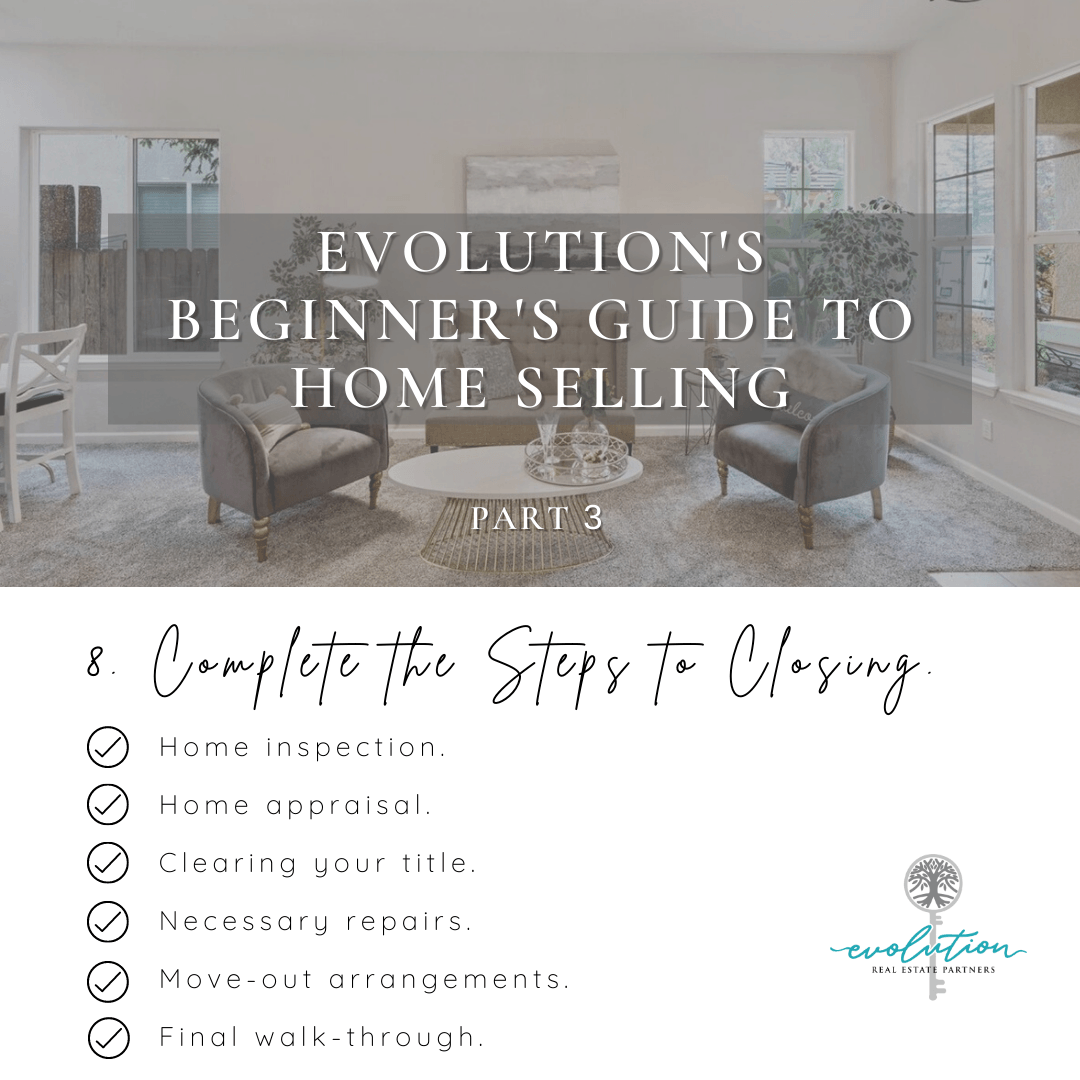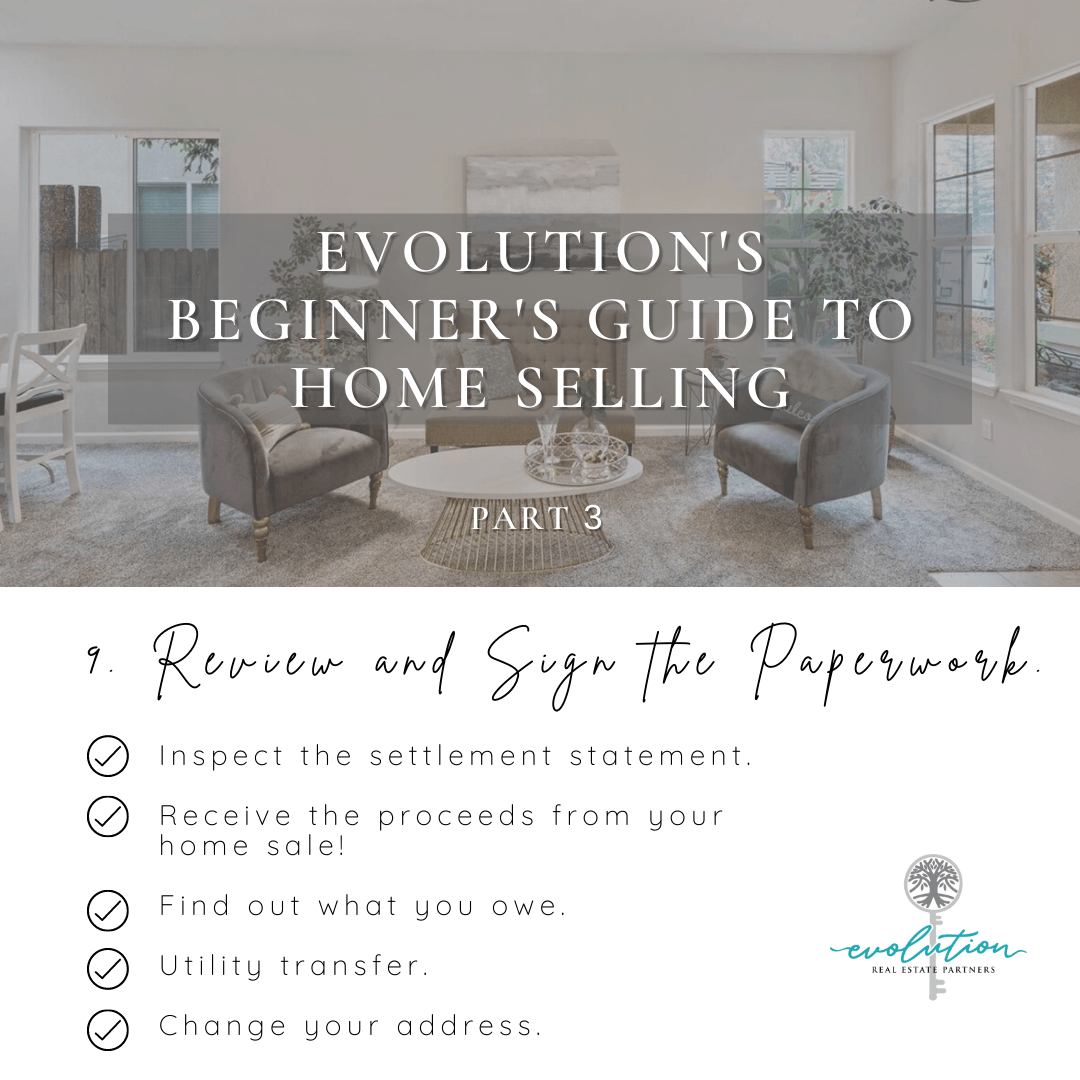First Time Selling Your Home? Here's How To Do It (Part 3)
You’ve put in the hard work of staging and marketing your home. Now, you’re seeing the results of your efforts as offers come rolling in.
Congratulations! You’re getting closer to finally selling your home. This chapter will guide you to make your closing as rewarding as possible.
Evolution’s Beginner’s Guide To Home Selling (Part III)
This is where your — and your agent’s — creativity and marketing skills are put to practice. How do you convince people that buying your home is a great move?

7.
Review Your Offers.
You may get offers the day your home hits the market, after several tours, or a month down the road. 2021 is a
Sellers Market, which means there are more buyers than homes available for sale. Now is a great time to sell because you have a higher chance of getting multiple offers.
When you do, keep these things in mind:
- Get advice from your real estate agent.
While reviewing offers, you might already start to form your decision. If you have multiple offers, you may be inclined to prefer one over the other. Get advice from your real estate agent before making a final decision. Your real estate agent is legally obligated to put your best interests first. With their experience and knowledge, they can help determine the best offer for you.
- Create a spreadsheet to compare offers.
Offers can look the same at first glance. You want a concrete place where you can quickly and specifically see their differences and strong points. Create a spreadsheet and input offer specifics such as offer price, payment method, and contingencies.
- Negotiate if you must.
Not satisfied with the offers? Don’t hesitate to negotiate. Get help from your real estate agent (who most likely has superior negotiating skills).

8.
Complete the Steps to Closing.
After accepting an offer, sign the offer agreement and send it to the escrow and title firm. Take care of any contingencies mentioned in the contract by the buyer, which may include an inspection and appraisal. You also need to clear the title and pay off any outstanding debts on the home.
Below are some items you need to take into account:
- Home inspection.
Some buyers will order a home inspection. An inspector will check the exterior and interior of your home for any damaged, defective, or safety concerns with the property.
- Home appraisal.
It’s a good idea to have your agent present during the home appraisal. They can answer any questions regarding permits or home features.
- Clearing your title.
A title search may be required to clear the title and close the sale. Taxes, loans, and contractor bills are some of the issues that might prevent the title from being cleared.
- Necessary repairs.
Hire professionals to complete any repairs you agreed to from the house inspection. Keep all repair-related documents and invoices to show the buyers. These will prove that the repair work lines up with their requests.
- Move-out arrangements.
Set a move-out date once the closing date has been set. Make arrangements so that your move is a seamless one. Double-check your storage spaces before heading out.
- Final walk-through. This is the buyer’s last chance for inspection. As a seller, you’re obligated to leave the home broom-clean, which means swept, vacuumed, and clear of any items that the buyer did not agree to buy.

9. Review and Sign the Paperwork. You’re now on the home stretch! But before you head out, there are a few things you need to do:
- Inspect the settlement statement.
Think of the settlement statement as the receipt of your home sale. It details all the fees and credits from the entire transaction. This may include the pre-listing inspection cost, agent commission, transfer taxes, fees for appraisal, settlement, and titles, and property taxes. The settlement statement will show your net profits as a seller and the charges that the buyer owes.
- Receive the proceeds from your home sale!
Congratulations on your home sale!
- Find out what you owe.
Determine if you owe anything on the sale, such as capital taxes.
- Utility transfer.
It is always a good idea to leave your utilities on until the next business day after closing.
- Change your address. Don’t forget to change your address and forward your mail. Notify family and friends and any service providers regarding your move.
Selling a home for the first time may be intimidating, but it can also be rewarding! When your move-out is smooth and without trouble, you also give the new owner of your home a great move-in experience.
What you do from start to finish makes all the difference. Use this guide to make your home-selling experience successful.
We’d love to help you make your home-selling experience a success story.
Talk to us!














